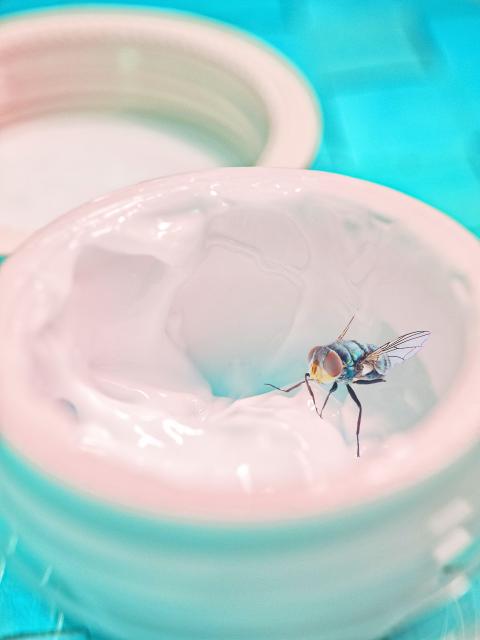Chinese practice
美中不足
one slight blemish

Photo: Paul Cooper, Taipei Times
照片:台北時報記者古德謙攝
in an otherwise perfect thing
(mei3 zhong1 bu4 zu2)
成語「美中不足」意指雖然某事物很美,但仍有缺點。這句話出自明朝劇作家吾丘瑞的《運甓記》,書中寫的是晉朝名將及名官陶侃(西元二五九到三三四年)由貧至富之故事。
在故事中,陶侃夢見自己生出八隻翅膀,飛上了天,看見神秘的九道門。他飛過了八道門,但飛不過第九道,而被守門人擋下了,守門人打落了他左邊的一隻翅膀。陶侃夢醒後,覺得腋下疼痛,便找人來告訴他這夢是吉是凶。
中國原本被劃分為九個州。解夢人說,飛越八道門意為陶侃以後將會鎮守八州;最後一道門代表有一州是他永遠無法掌握的。被打斷的翅膀指的是一個缺陷,是阻礙他的一個部分。
在英語中有一個片語a fly in the ointment(油膏裡的蒼蠅),看似相同,但在意思上有細微的差異。油膏原本是用在宗教的膏抹儀式。在詹姆士王欽定版聖經傳道書第十章第一節提到,「死蒼蠅使作香的膏油發出臭氣;這樣,一點愚昧也能敗壞智慧和尊榮。」
這句話或許應再多做解釋。Apothecary是藥局的古字;doth是does一字的古寫法;folly意為不智之舉。換句話說,一個小過失即可傷害人,即便這人在其他方面有著明智與可敬的聲譽。在現今的用法中,the fly in the ointment 意指一個小細節便毀了全部,一顆老鼠屎壞了一鍋粥。而「美中不足」則指事物雖整體上可接受,但略有瑕疵,與a fly in the ointment 稍有不同。
(台北時報編譯林俐凱譯)
這房子依山傍水美極了,但美中不足的是離上班的地方太遠了。
(This apartment is close to the mountains and looks out over a river. It’s really beautiful, but the fly in the ointment is that it is too far from work.)
英文練習
A (the) fly in the ointment
The Chinese proverb 美中不足 means that, although an object is beautiful, it nevertheless does contain a flaw. The phrase appeared in the book Moving Bricks, or yun pi ji, by the Ming dynasty author Wu Qiurui, in which he relates how the renowned Jin dynasty general and governor Tao Kan (259–334 AD) went from poverty to fabulous wealth.
In the book, Tao Kan dreams he has sprouted eight wings, and flies up to the heavens where he sees the mythical nine Heavenly Gates. He flies through eight of them, but cannot pass through the ninth, and is struck down by the guardian, who breaks off one of the wings on his left side. On waking, he feels a pain in his armpit, and he goes to find someone who can tell him whether the dream was auspicious or not.
China was originally divided into nine provinces. The dream interpreter said that flying through eight of the gates means that he would later be put in charge of eight; the last gate represented the province that he would never control. The wing that was struck off referred to a flaw, one aspect of him that held him back.
There is a phrase in English: “a fly in the ointment,” which although appears similar, is actually subtly different in meaning. Ointment was originally a preparation that would be used to anoint people with. The King James Version of the Bible, Ecclesiastes 10:1, says, “Dead flies cause the ointment of the apothecary to send forth a stinking savour: so doth a little folly him that is in reputation for wisdom and honour.”
That sentence perhaps requires a little explanation. “Apothecary” is an old word for pharmacy; “doth” is an archaic rendering of “does”; “folly” means an unwise act. In other words, one tiny misstep can harm a person, even if that person otherwise had a reputation for being wise and honorable.
In modern usage, “a fly in the ointment” means an apparently insignificant detail that spoils the whole, whereas 美中不足 usually refers to a thing or situation that, while imperfect in some way, is still acceptable and not totally spoilt. (Paul Cooper, Taipei Times)
I’m really looking forward to our trip, but the fly in the ointment is that I’ll have to take a conference call on the second day.
(真的好期待我們的旅行。可惜的是,行程第二天我得要接一個會議電話。)

Computex, Asia’s biggest electronics conference, kicked off Monday in Taipei, and as in years past drew industry chieftains from Nvidia Corp.’s Jensen Huang and Qualcomm Inc.’s Cristiano Amon to Young Liu of Foxconn, which makes the bulk of the world’s iPhones and Nvidia servers. But while last year’s event was a celebration of the post-ChatGPT AI boom, executives this time are likely grappling with the uncertainty of the Trump administration’s effort to reshape the global trade order — disrupting a decades-old model for tech manufacturing. This year’s exhibition will of course feature the hardware required to bring artificial intelligence to life.

For many people, allergies are an all-too-familiar annoyance. The constant sneezing, itching, and watery eyes are just a few clear signs of allergies, which is a surprisingly common condition affecting millions worldwide. But what exactly triggers these reactions, and how can we cope with them? Allergies arise from a misunderstanding between our immune system and seemingly harmless substances. Under normal circumstances, the immune system acts as our body’s personal bodyguard, diligently identifying and eliminating threats like viruses and bacteria. However, in individuals with allergies, the immune system mistakenly identifies certain substances, called allergens, as invaders. This triggers a reaction, leading to

A: South Korean supergroup BTS member J-Hope, EXO member Xiumin and other various artists are set to tour Taiwan. B: Is J-Hope the first BTS member to visit as a solo singer? A: Yup, he’s going to stage two shows in Taoyuan over the weekend. B: All BTS fans, nicknamed “ARMY,” must be so happy. I wonder when the seven-member group can finally stage a comeback again. A: Well, the good news is the five members currently performing military service will all leave the army next month. So the fans’ long wait is about to end. A: 南韓天團防彈少年團BTS的J-Hope,和EXO的Xiumin等多位熱門歌手最近都要來台開唱。 B:

A: Apart from BTS’ J-Hope and EXO’s Xiumin, Hong Kong singer Eason Chan is holding six concerts in Kaohsiung. B: And versatile British musician Jacob Collier is visiting Taiwan for the first time, performing in New Taipei City tonight. A: US singer Lauv and rock band LANY will also stage individual shows in Kaohsiung next week. B: Plus, Singaporean singer JJ Lin will hold two concerts at the Taipei Dome in early June. A: Which show are you going to? A: 除了BTS的J-Hope和EXO的Xiumin,香港歌王陳奕迅正在高雄熱唱6場。 B: 而多才多藝的英國歌手雅各柯里爾首度訪台,今晚即將在新北開唱! A: 美國歌手洛夫、搖滾樂團藍尼下週也分別在高雄演出。 B: 此外新加坡歌王林俊傑則將於6月初,首次挑戰台北大巨蛋嗨唱兩場。 A: 你想去聽誰的演唱會? (By Eddy Chang, Taipei Times/台北時報張迪)